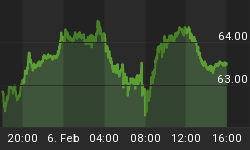
Originally posted at Sprott Money February 18, 2016
In my last post on Sprott Money, I pointed out the frightening truth: the ECB is strongly considering eliminating the €500 bill from circulation, reducing their physical money pool by approximately 30% in one fell swoop.
The ramifications of this are scary, to say the least. We know that central banksters are hell-bent on managing as many aspects of our financial lives as possible. The ability to eliminate physical cash from our modern-day society would grant them unquestionable control and the ability to steal at will whenever a crisis arises.
Mario Draghi knows this, the ECB knows this, and the FED knows this. Sadly, the masses do not and are utterly unaware of what is happening behind the scenes - actions that are destined to change our course in history forever.
If the ECB is successful in eliminating the €500 note, then the €200 is next, followed by the €100 and then the entire cash system itself - they hate it all and will not stop until we are on a cashless, electronic-based system.
The environment that this new system paints is scary enough as it stands, yet if you think that European bankers are alone in their quest for a cashless system, then you are horribly mistaken.
Western Central bankers know the control that such a system would create. They know the power that they are set to gain and are frothing at the mouth to obtain it.
Larry Summers, a potential FED chairman candidate, is one of those people. He had the following to say in a recently released article in the Washington Post, titled "It's time to kill the $100 bill."
Harvard's Mossavar Rahmani Center for Business and Government, which I am privileged to direct, has just issued an important paper by senior fellow Peter Sands and a group of student collaborators. The paper makes a compelling case for stopping the issuance of high denomination notes like the 500 euro note and $100 bill or even withdrawing them from circulation.
I remember that when the euro was being designed in the late 1990s, I argued with my European G7 colleagues that skirmishing over seigniorage by issuing a 500 euro note was highly irresponsible and mostly would be a boon to corruption and crime. Since the crime and corruption in significant part would happen outside European borders, I suggested that, to paraphrase John Connally, it was their currency, but would be everyone's problem. And I made clear that in the context of an international agreement, the U.S. would consider policy regarding the $100 bill. But because the Germans were committed to having a high denomination note, the issue was never seriously debated in international forums.
The fact that -- as Sands points out -- in certain circles the 500 euro note is known as the "Bin Laden" confirms the arguments against it. Sands' extensive analysis is totally convincing on the linkage between high denomination notes and crime. He is surely right that illicit activities are facilitated when a million dollars weighs 2.2 pounds as with the 500 euro note rather than more than 50 pounds as would be the case if the $20 bill was the high denomination note. And he is equally correct in arguing that technology is obviating whatever need there may ever have been for high denomination notes in legal commerce.
As the title suggests, Larry and his colleagues are calling for the death of the $100 bill in the United States as well as the end of the €500 note. One of the main excuses given is in the name of fighting "terrorism," the boogeyman in the dark, an excuse that has been used since 9/11 to take away personal freedoms and liberties the world over.
Yet they are being deceptive, for they are holding back on their true intentions. Central Banksters could care less about our safety and care about one thing and one thing alone: Control of the money system and control over every facet of your financial life. This is why they hate physical money and this is why they hate gold and silver. Resist this movement my friends, this won't be the last shot they fire.















